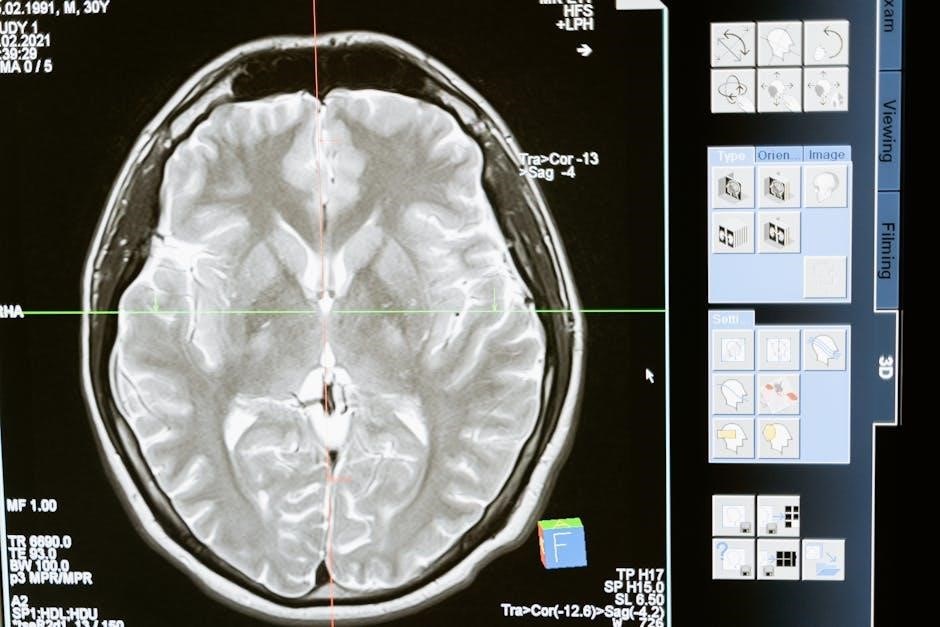The Year 4 Reasoning Tests are designed to assess problem-solving and critical thinking skills, aligning with the UK curriculum. These tests, available in PDF format, provide a comprehensive way to evaluate mathematical reasoning abilities. They cover various topics such as fractions, sequences, and data interpretation, helping students develop essential skills for academic success. Regular practice with these tests ensures improved confidence and performance in problem-solving tasks.
Overview of the Year 4 Reasoning Test PDF
The Year 4 Reasoning Test PDF is a comprehensive resource designed to help students prepare for their maths reasoning assessments. It typically includes two practice tests, each containing 17 questions, along with answer sheets and marking guides. The tests cover a range of topics such as fractions, sequences, time problems, geometry, and data representation. Each question is carefully crafted to evaluate problem-solving skills and critical thinking. The PDF format ensures ease of use, allowing parents and teachers to print or view the tests digitally. Accompanying spreadsheets simplify the process of tracking progress and identifying areas for improvement. These resources are aligned with the UK curriculum and provide a structured approach to mastering reasoning skills. They are ideal for regular practice, helping students build confidence and fluency in mathematical problem-solving.
Importance of Reasoning Tests in the UK Curriculum
Reasoning tests play a vital role in the UK curriculum, particularly in Year 4, as they assess students’ ability to think critically and solve complex problems. These tests are designed to evaluate not just mathematical knowledge, but also the application of skills in real-world scenarios. By focusing on problem-solving, they help students develop logical thinking and analytical abilities, which are essential for future academic success. The tests also prepare students for higher-level challenges, fostering resilience and confidence. Schools use these assessments to identify strengths and areas needing improvement, ensuring tailored support. Regular practice with reasoning tests, such as those found in Year 4 Reasoning Test PDFs, is crucial for building these skills and meeting curriculum expectations.
Structure of the Year 4 Reasoning Test
The Year 4 Reasoning Test typically consists of 17 questions, blending multiple-choice and short-answer formats. It covers fractions, sequences, time, geometry, and data representation, with a 40-minute time limit.

Question Types and Formats
The Year 4 Reasoning Test features a mix of multiple-choice and short-answer questions, designed to evaluate problem-solving skills. Questions often involve matching clock faces to digital times, completing tables, and solving fraction problems; Some tasks require sequencing numbers or shapes, while others involve interpreting data from charts or graphs. The test also includes word problems that challenge students to apply mathematical concepts to real-life scenarios. Clear instructions are provided for each question, ensuring students understand what is expected. The variety of question types helps assess different aspects of reasoning, from logical thinking to numerical accuracy. This diverse format prepares students for a wide range of mathematical challenges.
Time Allocation and Test Duration
The Year 4 Reasoning Test is designed to be completed within approximately 40 minutes, allowing students to demonstrate their problem-solving skills without undue time pressure. Each test typically contains 16 to 17 questions, covering a range of topics such as fractions, sequences, and data interpretation. Students are encouraged to manage their time effectively, ensuring they attempt all questions. The test does not permit the use of calculators, emphasizing the importance of mental math and quick reasoning. Clear instructions are provided at the beginning, guiding students on how to approach each question. Practicing time management is crucial, as it helps students complete the test confidently and efficiently, ensuring they showcase their full potential; Regular practice with past papers can help improve speed and accuracy, reducing anxiety during the actual test.
Scoring System and Marking Criteria
The Year 4 Reasoning Test uses a structured scoring system, with each question carrying a specific mark value. Tests typically have a total of 31 marks, distributed across 16 to 17 questions. Some questions are worth 1 mark, while others, requiring more complex problem-solving, are worth 2 marks. Answer sheets and marking guides are provided in the PDF resources, ensuring accurate assessment. The marking criteria focus on correct answers and the logical presentation of solutions. Understanding the scoring system helps parents and teachers evaluate student performance effectively. Regular practice with these tests allows students to familiarize themselves with the marking scheme, improving their ability to allocate effort appropriately during the test. This transparency in scoring supports targeted practice and skill development.
Key Topics Covered in the Test
The Year 4 Reasoning Test covers essential mathematical areas such as fractions, sequences, time problems, geometry, and data interpretation. These topics enhance problem-solving and logical thinking skills.
Fractions and Unit Fractions
Fractions and unit fractions are fundamental topics in the Year 4 Reasoning Test, focusing on understanding and comparing fractional values. Questions often involve ordering unit fractions from smallest to largest, such as 1/2, 1/4, and 1/8. Students are also required to solve problems involving equivalent fractions and simple operations with fractions. The test includes word problems that apply fractional concepts to real-world scenarios, enhancing mathematical reasoning skills. Practice materials, like the Year 4 Reasoning Test PDF, provide exercises to master these concepts, ensuring students can interpret and manipulate fractions confidently. This topic is crucial for building a strong foundation in mathematics and problem-solving abilities.
Sequences and Patterns
Sequences and patterns are a key component of the Year 4 Reasoning Test, designed to evaluate logical thinking and problem-solving skills. Questions typically involve identifying the next shape or number in a series, based on a specific rule or pattern. For example, students might be asked to complete a numerical sequence or determine the missing shape in a geometric pattern. These problems encourage critical thinking and the ability to recognize relationships between elements. Practice materials, such as the Year 4 Reasoning Test PDF, often include exercises that focus on both simple and complex sequences, helping students develop their analytical abilities. Mastering this topic is essential for building a strong foundation in mathematical reasoning and problem-solving strategies.
Time and Clock Problems
Time and clock problems in the Year 4 Reasoning Test assess students’ ability to understand and work with time concepts. Questions often involve reading analog clocks, converting between analog and digital times, and solving word problems related to time intervals. For example, students might be asked to join a clock face to the correct digital time or calculate the duration between two times. These problems require a strong grasp of time measurement and mental math skills. Practice materials, such as the Year 4 Reasoning Test PDF, include exercises that help students master these concepts. Regular practice with these types of problems ensures improved accuracy and confidence in handling time-based questions.
Geometry and Shape Recognition
Geometry and shape recognition are key components of the Year 4 Reasoning Test, focusing on identifying and understanding various shapes and their properties. Students are expected to recognize and classify 2D and 3D shapes, including triangles, quadrilaterals, and polygons. Problems often involve identifying shapes based on their sides, angles, and symmetry. Additionally, students may be asked to determine the perimeter and area of shapes or to solve problems involving shape patterns. Practice materials, such as the Year 4 Reasoning Test PDF, include exercises that help students master these concepts. Regular practice with geometry problems ensures improved spatial awareness and problem-solving skills, which are essential for success in the test and beyond.
Data Representation and Interpretation
Data representation and interpretation are crucial skills assessed in the Year 4 Reasoning Test. Students are required to analyze and interpret data presented in various formats, such as bar charts, pictograms, and tables. Questions often involve extracting information, calculating totals, or identifying patterns within the data. For example, pupils might determine the most popular item in a survey or compare quantities across different categories. Practice materials, including the Year 4 Reasoning Test PDF, provide exercises to help students master these skills. Regular practice with data interpretation tasks enhances analytical thinking and prepares students to apply these skills in real-world scenarios, making it a vital part of their mathematical development.

Preparation Strategies for the Test
Effective preparation involves using Year 4 Reasoning Test PDFs, practicing past papers, and focusing on time management. Utilize answer sheets and video tutorials to enhance understanding and build confidence.
Practice Tests and Past Papers
Practice tests and past papers are essential tools for preparing for the Year 4 Reasoning Test. They provide students with hands-on experience of the test format, helping them familiarize themselves with question types and time constraints. Many resources, such as the Year 4 Reasoning Test PDF, include practice questions and answer sheets, allowing for self-assessment and improvement; Regular use of past papers helps identify weak areas and builds confidence. For example, the Year 4 Reasoning Test Set 2 Paper B includes 17 questions covering fractions, sequences, and data representation. These resources are often accompanied by marking guides, enabling parents and teachers to track progress effectively. Video tutorials and interactive tools also complement practice tests, offering detailed explanations for complex problems. Consistent practice with these materials ensures readiness for the actual test.
Time Management Techniques
Effective time management is crucial for success in the Year 4 Reasoning Test. With a total of 17 questions and a 40-minute duration, students should allocate approximately 2-3 minutes per question. Start by skimming through the test to identify easier questions and tackle them first, saving more challenging ones for later. This strategy helps build confidence and ensures no time is wasted on difficult problems early on. For multiple-choice questions, use the process of elimination to narrow down options. Avoid spending too long on a single question, as this can lead to rushing toward the end. Practice tests and past papers are invaluable for refining time management skills, allowing students to simulate exam conditions and improve their speed and accuracy. Regular practice helps students stay calm and focused during the actual test.
Understanding Question Types
The Year 4 Reasoning Test PDF includes a variety of question types, such as multiple-choice, short-answer, and problem-solving tasks. These questions are designed to assess different reasoning skills, including logical thinking and mathematical problem-solving. Many questions focus on fractions, sequences, time, geometry, and data representation. For example, students may be asked to order unit fractions or match clock faces to digital times. Understanding each question type helps students approach them confidently. Multiple-choice questions often require selecting the correct answer from a list, while short-answer questions demand concise, accurate responses. Familiarizing yourself with these formats through practice tests and past papers is essential for success. This preparation helps students recognize patterns and develop strategies tailored to each question type, improving overall performance and problem-solving efficiency. Regular practice also reduces anxiety and builds confidence in tackling diverse question formats.
Developing Problem-Solving Skills
Developing problem-solving skills is crucial for success in Year 4 Reasoning Tests. The test PDF includes tasks that inspire mathematical thinking, such as matching clock faces to digital times and ordering unit fractions. Resources like I See Reasoning Y4 provide engaging activities to enhance critical thinking. Video tutorials and online courses offer step-by-step explanations, helping students understand complex concepts. Regular practice with past papers and interactive tools builds confidence and improves speed. Encouraging children to break down problems into smaller steps fosters logical reasoning; Using visual aids, like shading or diagrams, can also aid in solving geometry and data representation questions. These strategies help students approach challenges methodically, ensuring they develop robust problem-solving abilities essential for academic success. Consistent practice and exposure to diverse question types are key to mastering these skills.

Resources for Year 4 Reasoning Test
Free Year 4 Reasoning Test PDFs are available for download, featuring practice questions, answer sheets, and interactive tools. Video tutorials and online courses also support preparation.
Free Year 4 Reasoning Test PDF Downloads
Free Year 4 Reasoning Test PDFs are widely available online, offering practice questions and answer sheets. These resources include two tests, each with 17 questions, covering fractions, sequences, and data interpretation. Accompanying spreadsheets help track progress, while video tutorials provide additional support. Designed for the UK curriculum, these PDFs are ideal for home or classroom use. They include timed tests, such as a 40-minute paper with 16 questions, focusing on problem-solving skills. Resources like White Rose Maths offer progress checks for spring and summer terms, ensuring comprehensive preparation. Downloadable packs include answer guides, making them a valuable tool for parents and teachers. These free materials are essential for building confidence and improving reasoning abilities in Year 4 students.
Answer Sheets and Marking Guides
Answer sheets and marking guides are essential companions to Year 4 Reasoning Test PDFs, providing clear solutions and criteria for assessment. These resources help parents and teachers evaluate student performance accurately. Many PDF packs include ready-made spreadsheets to input marks, simplifying progress tracking; Detailed answer keys explain correct responses, while marking guides outline how points are allocated for each question. For example, questions like matching clock faces to digital times offer 2 marks for accuracy. These tools ensure consistency in grading and help identify areas for improvement. Video tutorials, such as those by Dylan, also offer insights into solving questions, making them invaluable for understanding the marking process and improving problem-solving skills.
Interactive Tools and Spreadsheets
Interactive tools and spreadsheets are invaluable resources for preparing Year 4 students, offering dynamic ways to engage with reasoning tests. Many PDF packs include ready-made spreadsheets to track progress and input marks, providing immediate feedback. These tools help identify strengths and weaknesses, enabling targeted practice. For instance, spreadsheets can automatically calculate scores, saving time for parents and teachers. Additionally, interactive tools like PowerPoint presentations and video tutorials enhance understanding by breaking down complex problems. Resources such as Dylan’s video explanations and White Rose Maths’ progress checks further support learning. These tools cater to different learning styles, making preparation more effective and enjoyable for students. They also empower educators to monitor development and tailor teaching strategies accordingly.
Video Tutorials and Online Courses
Video tutorials and online courses are excellent resources for Year 4 students preparing for reasoning tests. Platforms like White Rose Maths offer detailed video explanations, such as Dylan’s walkthroughs of past papers, to clarify complex problems. These tutorials provide step-by-step guidance, helping students understand how to approach various question types. Online courses often include interactive lessons and practice exercises, making learning engaging. They cover key topics like fractions, sequences, and data interpretation, ensuring a thorough understanding. Many resources are designed to support both students and teachers, offering tips and strategies for effective preparation. By leveraging these tools, students can build confidence and improve their problem-solving skills at their own pace. Regular use of video tutorials and online courses enhances learning outcomes and test performance.

Tips for Parents and Teachers
Encourage regular practice with Year 4 reasoning test PDFs and discuss results to identify strengths and weaknesses. Use interactive tools and video tutorials to make learning engaging. Create a structured study schedule to ensure consistent preparation and provide positive feedback to build confidence. Utilize answer sheets and marking guides to track progress effectively. Incorporate real-world examples to help students relate to problems, fostering a deeper understanding of mathematical concepts and reasoning skills.

How to Support Your Child’s Preparation
Support your child by providing regular practice with Year 4 reasoning test PDFs, ensuring they understand each question type. Use answer sheets and marking guides to track progress and identify areas needing improvement. Encourage critical thinking by discussing problem-solving strategies and real-world applications of the topics. Create a structured study schedule to maintain consistency and gradually increase difficulty as confidence grows. Utilize interactive tools and video tutorials to make learning engaging and fun. Praise their efforts and achievements to build confidence, and provide constructive feedback to help them overcome challenges. By fostering a positive and supportive environment, you can help your child excel in their reasoning skills and prepare effectively for the test.
Creating a Study Schedule
Creating a structured study schedule is essential for effective preparation. Allocate specific times each week for practicing Year 4 reasoning test PDFs, focusing on different topics like fractions, sequences, and data interpretation. Start with shorter sessions and gradually increase duration as your child becomes more comfortable. Incorporate breaks to maintain focus and prevent burnout. Prioritize areas where improvement is needed, using answer sheets to identify weak points. Consistency is key; regular practice helps build confidence and familiarity with test formats. Use interactive tools and video tutorials to supplement learning, ensuring a well-rounded approach. By sticking to the schedule, your child will be well-prepared and confident for the test, achieving their full potential in reasoning and problem-solving skills.
Encouraging Critical Thinking
Encouraging critical thinking is vital for success in Year 4 reasoning tests. Engage your child in discussions about problem-solving strategies and real-world applications of mathematical concepts. Use open-ended questions to prompt deeper analysis, such as “How else could this problem be solved?” or “Why do you think this pattern works?” Encourage them to explain their reasoning, fostering a habit of logical thinking. Provide opportunities to tackle challenges independently, then review their approaches together. Utilize resources like video tutorials and interactive tools to explore different methods. Celebrate their efforts, not just results, to build confidence. By nurturing a curious and analytical mindset, you help your child develop the skills needed to excel in reasoning tests and beyond.
Common Challenges and Solutions
Common challenges include test anxiety, time management, and understanding complex questions. Solutions involve deep breathing exercises, timed practice drills, and focused revision of weaker areas.
Overcoming Test Anxiety
Test anxiety can hinder performance in Year 4 reasoning tests. To address this, encourage regular practice with sample papers to build familiarity and confidence. Understanding question types and time management strategies can reduce stress. Parents and teachers should foster a positive mindset, emphasizing effort over perfection. Providing a calm study environment and discussing concerns openly helps alleviate anxiety. Utilize resources like the Year 4 Reasoning Test PDF and video tutorials to make preparation engaging. Remind children that it’s okay to make mistakes, as they are part of the learning process. Consistent practice and reassurance can significantly reduce test-related stress, allowing students to approach the test with confidence and clarity.

Improving Speed and Accuracy
Improving speed and accuracy in Year 4 reasoning tests requires consistent practice and effective strategies. Utilize practice tests and past papers to familiarize your child with question formats and time constraints. Encourage timed sessions to build stamina and efficiency. Focus on understanding question types, such as fractions and sequences, to reduce hesitation. Review mistakes to identify weak areas and address them through targeted practice. Teach techniques like skimming questions first to manage time better. Use interactive tools and spreadsheets to track progress and highlight improvements. Positive reinforcement and consistent practice can significantly enhance both speed and accuracy, helping your child approach the test with confidence and readiness.
Addressing Weak Areas

Identifying and addressing weak areas is crucial for improving performance in Year 4 reasoning tests. Begin by analyzing practice test results to pinpoint where your child struggles most. Focus on topics like fractions, sequences, or geometry, which are commonly challenging. Use targeted practice materials, such as past papers or online resources, to strengthen these areas. Encourage your child to review mistakes and understand the reasoning behind correct answers. Video tutorials and interactive tools can provide additional support. Regularly revisit weak areas to ensure mastery. Creating a study schedule that allocates extra time to these topics can help build confidence and proficiency. Consistent effort and focused practice will lead to noticeable improvement over time.
The Year 4 Reasoning Test PDF is a valuable resource for preparing students, focusing on problem-solving and critical thinking. Continuous practice and confidence-building are key to success.


Final Tips for Success
To achieve success in the Year 4 Reasoning Test, regular practice with PDF resources is essential. Focus on understanding question types and managing time effectively. Review mistakes to improve accuracy and speed. Encourage critical thinking and problem-solving skills through interactive tools and video tutorials. Stay calm during the test and read instructions carefully. Utilize answer sheets and marking guides to track progress. Parents and teachers should create a supportive study environment and celebrate small achievements. Continuous practice builds confidence and familiarity with test formats. By following these strategies, students can approach the test with confidence and achieve their best results. Consistent effort and positive reinforcement are key to long-term success.
Importance of Continuous Practice
Continuous practice is vital for mastering the Year 4 Reasoning Test. Regularly working through PDF resources helps students become familiar with question formats and builds confidence. It improves speed and accuracy, essential for completing the test within the allocated time. Practicing past papers and using interactive tools allows students to identify and address weak areas. Consistent practice also reduces test anxiety and fosters a deeper understanding of key topics like fractions, sequences, and data interpretation. Encourage a structured study schedule and utilize free resources, such as answer sheets and video tutorials, to reinforce learning. By practicing regularly, students develop problem-solving skills and critical thinking, leading to better performance and long-term academic success.